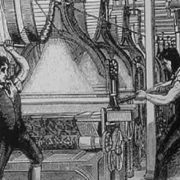The only way to introduce Poetic Justice Warrior Henry Hazlitt is directly, with clarity, focused on principles, and using examples. This is exactly what he did during seventy years of writing, nearly every day, promoting the virtues of classical liberalism and the morality of capitalism. Hazlitt’s greatest asset was a highly trained mind, one that he developed on his own. During his last year of high school Hazlitt recalled that he “developed what I suppose might be called intellectual awareness.” When he was 21 years old he published his first book, Thinking as a Science. In it he writes,
Have you not often been in a waiting room, noticed people all around you reading, and finding yourself without any reading matter, and wished that you had some to occupy your mind? Did it ever occur to you that you had within you the power to occupy your mind, and do it more profitably than all those readers? Did it ever occur to you to think?
Hazlitt is talking about thinking with a purpose, to solve a problem, to choose a course to pursue. Real thinking, hard thinking, independent thinking, a systemization of all thought. Quoting Ella Wilcox, “It would do for education, government and economics what the alphabet did for language, movable type for printing, and the scale for music.” His systemization is based on a hierarchy of explicitly defined values, something most people are averse to.
Economics in One Lesson
While Henry Hazlitt wrote 20 books including The Anatomy of Criticism, Man vs. the Welfare State, The Foundations of Morality, The Failure of the New Economics, The Conquest of Poverty, the novel Time Will Run Back, Economics in One Lesson became the most popular basic book on economics of all time. As entrepreneur and author Tom Malone says about Economics in One Lesson.
Hazlitt points out the vital need to understand economic policies in terms of how they impact the individual, saying, “What is harmful or disastrous to an individual must be equally harmful or disastrous to the collection of individuals that make up a nation.” He demolishes the major economic fallacies that are promoted by power-lusting politicians and collectivists of every stripe.”
Not only did Hazlitt make rational economic thinking available to mass audiences, he did the same thing with the irrational, convoluted, and pretentious economic thinking of John Maynard Keynes. Chapter by chapter, line by line, Hazlitt took apart Keynes’ widely accepted General Theory by applying Keynes’ ideas to real-life economic choices. Anyone who reads Hazlitt’s principled and consistent The Failure of the New Economics could never abide by Keynes’ General Theory, but statists and collectivists everywhere consider it the bible for their economic central planning schemes.
Hazlitt also understood that Keynes was nothing but a neo-Marxist, and had plenty to say about Marx. For example,
The whole gospel of Karl Marx can be summed up in a single sentence: Hate the man who is better off than you are. Never under any circumstances admit that his success may be due to his own efforts. Never under any circumstances admit that your own failure may be owing to your own weakness. This basic hatred is the heart of Marxism.
From a young age Hazlitt realized that the attacks against capitalism were gaining momentum. But unlike most conservatives, he knew in his heart that capitalism had to be defended on ethical grounds.
The Foundations of Morality
At the age of 70, in 1964, Hazlitt wrote The Foundations of Morality, a book about which he said he was most proud. In fact, during Hazlitt’s 70th birthday celebration, Poetic Justice Warrior Ludwig von Mises toasted,
In this age of the great struggle in favor of freedom and the social system in which men can live as free men, you are our leader. You have indefatigably fought against the step-by-step advance of the powers anxious to destroy everything that human civilization has created over a long period of centuries. You are the economic conscience of our nation.
Extraordinary praise coming from the man whose personal motto was Virgil’s Aeneid. “Do not give in to evil but proceed ever more boldly against it.” In this book Hazlitt declared that capitalism must be defended on moral grounds, not practical.
What is under attack is the capitalist system; and it is attacked mainly on ethical grounds, as being materialistic, selfish, unjust, immoral, savagely competitive, callous, cruel, destructive. If the capitalistic system is really worth preserving, it is futile today to defend it merely on technical grounds (as being more productive, for example) unless we can show also that the socialist attacks on ethical grounds are false and baseless.
Henry Hazlitt’s relentless defense of human flourishing, sometimes single-handed, is rooted in his personal path toward self-creation. As a boy he attended a school for poor, fatherless boys (his father died at Henry’s age 2). His stepfather died when he was 13, leaving the family in dire straits again. In high school he set his mind on becoming a philosophy and psychology student at Harvard. Instead, he attended New York City’s tuition-free City College, dropped out, and went to work for the fledgling Wall Street Journal. His university was books and he was a marvelous student, first in his class.
The Wisdom of the Stoic
Hazlitt continued to write and work for another 28 years after The Foundations of Morality, including a compilation, along with his wife Frances, titled The Wisdom of the Stoics. He summarized his work as “I’ve been preaching liberty as against coercion; I’ve been preaching capitalism as against socialism; and I’ve been preaching this doctrine in every form and with any excuse.” His fellow freedom fighters are some of the most influential thinkers, authors, economists and activists of the 20th century.
As H. L. Mencken said upon selecting Hazlitt to succeed him at the American Mercury, he was the “only competent critic of the arts that I have heard of who was at the same time a competent economist, one of the few economists in human history who could really write.” Hazlitt’s review of Friedrich Hayek’s 1944 The Road to Serfdom led to a Reader’s Digest condensed version and helped catapult this book to worldwide acclaim. In 1950 he was also the co-founder of the libertarian magazine, The Freeman. It eventually became the Foundation for Economic Education, and now the stellar online magazine fee.org.
One of his heroes was Poetic Justice Warrior Frederic Bastiat; they shared a talent for reductio ad absurdum. As Hazlitt replied to Eleanor Roosevelt’s The Curse of Machinery, “Why should freight be carried from Chicago to New York by railroad when we could employ enormously more men, for example, to carry it all on their backs?” He was also an acquaintance of another proud defender of capitalism, personal liberty, and the morality of America’s founding, Poetic Justice Warrior Ayn Rand.
As poetic justice would have it, Hazlitt told Ms. Rand that Mises had remarked about Rand that “he was the most courageous man in America.” She was delighted and Hazlitt introduced them.












